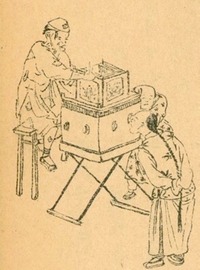Entire texts can be downloaded by clicking on the links in Publications. Opinion pieces and reviews are listed below:
Opinion Pieces:
06/12/2010, 'Mao's Great Leap to Famine' , International Herald Tribune:
The worst catastrophe in China’s history, and one of the worst anywhere, was the Great Famine of 1958 to 1962, and to this day the ruling Communist Party has not fully acknowledged the degree to which it was a direct result of the forcible herding of villagers into communes under the “Great Leap Forward” that Mao Zedong launched in 1958. To this day, the party attempts to cover up the disaster, usually by blaming the weather. Yet detailed records of the horror exist in the party’s own national and local archives. read more
20/10/2010, 'Chinese History: The Great Leap Backward', History Today:
In the People’s Republic of China, archives do not belong to the people, they belong to the party. They are often housed in a special building on the local party committee premises, which are generally set among lush and lovingly manicured grounds closely guarded by military personnel. Access would have been unthinkable until a decade or so ago, but over the past few years a quiet revolution has been taking place as increasing quantities of documents older than 30 years have become available for consultation to professional historians armed with a letter of recommendation. read more
12/01/1996, 'Throw-Away Babies', Times Literary Supplement:
The People's Republic of China recently passed eugenic legislation to prevent what are called 'inferior births' from becoming a burden on the state and society. As Chen Muhua, Vice-President of the Standing Committee of the National People's Congress and President of the Women's Federation, declared: 'Eugenics not only affects the success of the state and the prosperity of the race, but also the well-being of the people and social stability.' read more
Reviews:
15/03/2011, Review of Niall Ferguson, Civilization in the Literary Review:
On 4 October 1957 a shiny steel sphere the size of a beach ball hurtled through the sky, emitting signals picked up by radio operators around the world. Taking the United States completely by surprise, the Soviet Union had successfully launched the world's first earth satellite, opening a new chapter in the space race that was met with both awe and fear. A month later Nikita Khrushchev promised that, by freeing the economy from the dead hand of Stalinism, he would create such abundance that even the United States would be left in the dust. read more
23/09/2005, Review of Philip Williams, The Great Wall of Confinement in the Times Higher:
Always in need of external enemies to deflect attention away from the misery it creates for its own people, the Communist Party of China never tires of portraying their country as a victim of imperialist aggression, Japan being a prime target. Yet even the large number of casualties suffered during the Japanese invasion of 1937-45 pales in comparison to the six to 10 million deaths caused by the communist regime, not including the many millions of deaths in labour camps and the 30 to 40 million deaths during the Great Leap Forward. read more
27/07/2001, Review of Peter Hessler, River Town, Times Literary Supplement:
Peter Hessler's River Town, about his time as a teacher of English literature in the town of Fuling on the Yangtze River during the late 1990s, is an elegant account of the experience of an outsider living in China. Thrust into a radically different society from anything he has previously known, Hessler presents a compelling portrait of a place caught mid-river in time, surrounded by astounding natural beauty, soon to be flooded on the completion of the controversial Three Gorges Dam. read more
09/06/2000, Review of Timothy Brook, China and Historical Capitalism in the Times Higher:
This book takes as its point of departure the Marxist-inspired approach of Immanuel Wallerstein, a notable practitioner of 'world-systems theory', to analyse how 'historical capitalism' has shaped knowledge of China. Predictably giving primacy to economic factors, Wallerstein sucks the life out of the past and flattens history to make it conform to his rigid vision of a world system. Human agency, technological innovations, cultural variables and historical contingencies are left out, as a concern with systemic processes sweeps away all evidence that might stand in the way of the author's disarmingly simplistic conclusion: capitalism is disruptive and 'the genie was let out of the box' around 1500, allowing the 'totally irrational' and 'insidious threat' of market-generated wealth to subject the world to its rule. read more
27/06/1997, Review of Gail Hershatter, Dangerous Pleasures in the Times Literary Supplement:
Facilitated by the emergence of new primary sources and the relatively easier access to archives and libraries in the mainland, a number of careful monographs have recently attempted to get closer to the pulse of life in one of China's most colourful and corrupt cities. An imaginative and detailed examination of prostitution in the free-wheeling port of Shanghai, Dangerous Pleasures shows the importance of sex-workers in the social and political history of late nineteenth- and twentieth-century China. read more
